Exploring the Gold Souq: Tradition and Trade in UAE
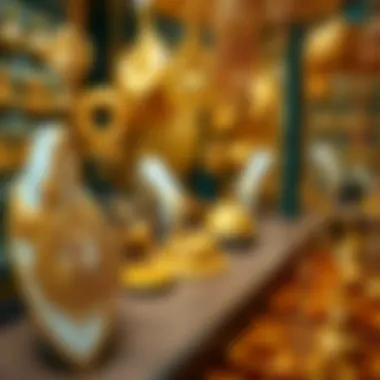
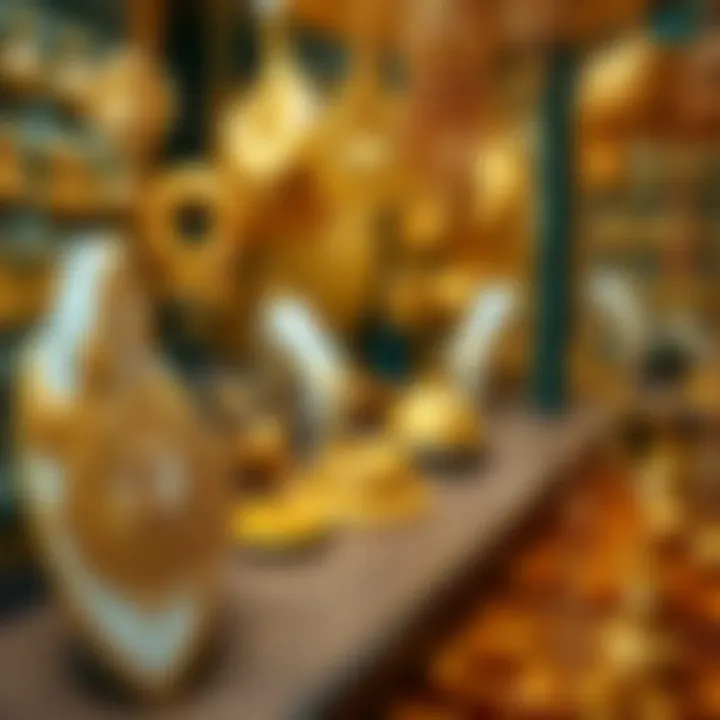
Intro
The Gold Souq in the UAE stands as a true testament to the regions’ rich tapestry of tradition and commerce. Located primarily in Dubai, this iconic marketplace is not just a hub for gold trading but also a cultural landmark where history and modernity collide. In the heart of the souq, the intricate designs of gold jewelry dazzle in the sunlight, drawing both locals and tourists alike. The atmosphere buzzes with the chatter of negotiations, the clinking of precious metal, and the scent of spices wafting from nearby stalls.
This marketplace is a microcosm of the UAE’s broader economic landscape. It reflects the historical significance of trade routes that once crisscrossed the Arabian Peninsula, connecting various civilizations. The Gold Souq thus acts as a bridge between the past and present, showcasing the craftsmanship and dedication of goldsmiths who have honed their skills over generations.
As we delve into the details of this unique trading environment, we’ll examine not only the offerings and business dynamics found within the souq but also its profound implications for local and global markets. This exploration is essential for anyone who wishes to understand the intricate relationship between culture and commerce in this vibrant region.
The Historical Context of the Gold Souq
Understanding the historical context of the Gold Souq in the UAE is like peeling back layers of an onion; each layer reveals a rich tapestry woven with trade, culture, and heritage. This souq isn’t just a marketplace for shiny trinkets; it’s a cornerstone of the social and economic life of the region. Learning its history helps one appreciate its current significance, elevating the experience of visiting this iconic destination.
Throughout the ages, the Gold Souq has served not merely as a site for commerce but also as a vibrant meeting point where stories and traditions intersect. The very stones of its pathways whisper tales of merchants and buyers who have traversed them for centuries, making it a witness to the evolution of trading practices and cultural exchanges.
Origins of the Gold Souq
The roots of the Gold Souq can be traced back to the early Islamic period, when trade routes flourished across the Arabian Peninsula. Many believe that the souq began as a simple marketplace where local craftsmen showcased their wares. Traders from far-off lands would visit, bringing with them not only gold but also spices, textiles, and precious jewels.
In those times, Dubai’s location made it a strategic trading hub, attracting merchants from Europe, India, and Southeast Asia. The Council of the merchants essentially laid the groundwork for the bustling marketplace we see today. Gold was considered a symbol of wealth, with the buying and selling of it serving not just economic but also social purposes, strengthening community bonds.
As the trade expanded, it transformed the small-scale market into a full-fledged souq. It became a crucial venue where buyers could haggle over prices, not solely for profit but also for the centerpiece of their social interactions. The practices that started then still echo in today’s rituals of bargaining and buying.
Evolution through the Ages
As time marched on, the Gold Souq evolved both in its physical appearance and trading dynamics. The discovery of oil in the mid-20th century propelled the UAE into the global spotlight, bringing an influx of wealth that changed the landscape dramatically.
The souq saw significant upgrades, from newly designed store fronts to improved infrastructure. What used to be an open-air market began to take on more permanent structures, leading to a blend of traditional Arab architectural aesthetics with modern conveniences.
In today’s market, amid the gleaming displays of gold jewelry, one can still encounter the age-old art of negotiation. For many locals, visiting the Gold Souq is not just about purchasing gold; it's a chance to connect with history, to engage in a time-honored tradition that has thrived despite the surging tides of change.
"The Gold Souq is not just a market; it's a living museum of trade and tradition."
This evolution has solidified the Gold Souq's place in not only local culture but also in international commerce. While the foundational elements remain unchanged—quality gold, intricate designs, and the spirit of trade—the souq now welcomes tourists, expanding its reach and resonance with those eager to learn about the UAE's fascinating past.
Thus, exploring the historical context of the Gold Souq offers a detailed insight into the dynamics of trade in the UAE, making it crucial for anyone who wants a deeper appreciation of this culturally rich marketplace.
Cultural Significance of the Gold Souq
The Gold Souq serves as much more than just a marketplace; it’s a vibrant tapestry woven from the threads of history, culture, and commerce. Understanding its cultural significance is crucial for anyone delving into the socio-economic landscape of the UAE. Beyond the sparkle of gold, this souq reflects the heart and soul of the nation’s heritage—a place where tradition meets contemporary trade practices while holding onto the past. Whether you're an investor or just someone interested in local culture, the Gold Souq offers invaluable insight into the UAE's identity.
A Reflection of UAE Heritage
The Gold Souq stands as a testament to the rich heritage of the UAE. Traditionally, gold trading has been a significant economic activity in this region. Historically, the desert sands did not yield much, but trade routes turned the UAE into a flourishing center for commerce. Gold was not just a metal; it represented wealth, stability, and social status.
In many Emirati families, weddings and ceremonies symbolize prosperity through the gifting of gold. The designs often include intricate shapes and motifs that resonate with local folklore, telling tales of the desert and the sea. This connection to heritage can be seen in the unique craftsmanship and attention to detail that jewelry makers practice. When you walk through the souq, you are not merely observing trade; you’re walking through a gallery of a living tradition.
Traditions and Customs
When navigating the Gold Souq, one quickly recognizes that it's more than a mere shopping experience. The dance of negotiation is fundamental here—haggling is both an art and a tradition. Buyers engage in a back-and-forth that often embarks with opening prices well above what the vendor expects to receive. This practice is not just about the money; it’s about respect and understanding.
As one browses through the stalls, you'll notice a variety of gold types. 22k and 24k gold jewelry is common, with each piece whispering a story from its intricate designs. There are also pieces that incorporate culturally significant symbols, blending tradition with artistry. The souq hosts various festivals and events throughout the year that further highlight these traditions, promoting the sacred relationship between gold and Emirati culture.
"The Gold Souq is not just a marketplace, it’s a mirror reflecting the enduring traditions of the Emirati people."
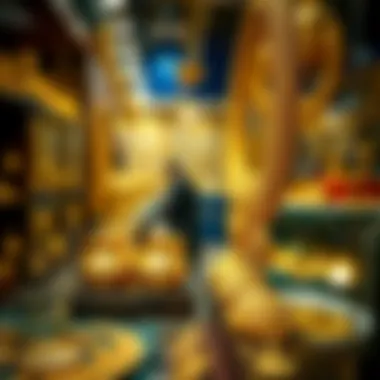
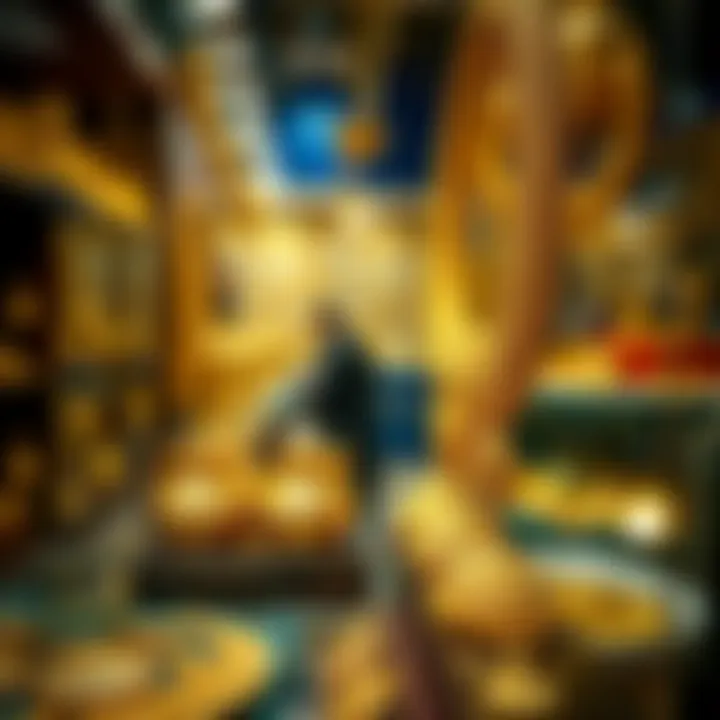
The simple act of purchasing gold here transcends mere commerce; it embodies respect for tradition, cultural identity, and a future that embraces modernity while honoring the past.
Economic Impact of the Gold Souq
The Gold Souq stands as a cornerstone of the UAE's economy, shaping both local commerce and the broader gold trade on a global scale. Understanding its economic impact is critical for comprehending the nexus between tradition and trade in this vibrant marketplace. The souq not only serves as an emblem of cultural wealth but also plays a vital role in job creation, foreign investment, and the nurturing of small businesses. As visitors roam the winding alleys lined with shimmering gold, they are unwittingly participating in a dynamic economic landscape that has a story well worth telling.
Contribution to Local Economy
The Gold Souq is a bustling hive of activity. It contributes significantly to the economic fabric of the Emirate of Dubai, attracting both tourists and locals alike. When we dive into the numbers, the effect is palpable.
- Employment Generation: The souq employs hundreds, if not thousands, of workers, from jewelers to sales staff, fostering economic stability for many families. Local artisans not only find work but also enjoy the opportunity to showcase their craftsmanship.
- Tourism Revenue: For visitors from around the world, the Gold Souq is often a highlight of their stay in the UAE. According to recent tourism reports, many tourists allocate a portion of their travel budget specifically for purchases at the souq, creating a ripple effect that benefits nearby businesses as well.
- Supporting Small Enterprises: Many vendors in the Gold Souq are small business owners who rely heavily on the foot traffic generated by the market. These entrepreneurs often provide unique, handcrafted items which not only tell a story but also support local economy.
Moreover, the prices at the souq are competitive, often attracting bargain hunters. Shoppers can enjoy a wide range of gold items— from intricate bangles to ornate necklaces— all at their own negotiation pace. This interaction not only boosts sales but strengthens community ties, turning transaction into relationship.
Role in Global Gold Trade
The Gold Souq does not limit itself to just local significance; it plays a crucial role on the global stage, being one of the leading hubs for gold trade and exchange. On any given day, one can witness the bustling activity as gold is sourced, sold, and shipped worldwide.
- Strategic Location: Geographically, the UAE benefits from its prime location which allows easy access to international markets in Europe and Asia. This strategic positioning aids in making Dubai a global trading powerhouse.
- Market Influence: Vendors at the souq have the power to set trends in gold designs and pricing, thus influencing consumer habits in other regions. The flair and style showcased here often penetrate markets beyond the UAE borders.
- Quality Standards: The souq adheres to stringent quality measures which not only helps maintain the reputation of UAE gold in global markets but ensures buyers are getting their money's worth. This encourages international customers to invest in gold from trustworthy sources.
"What we have here is not just the selling of gold, but the sharing of cultural wealth."
For further insights on the economic dynamics represented by gold markets, visit Britannica.
Whether you're a real estate agent, an investor, or simply looking into exploring golden opportunities, the Gold Souq reveals not just items of adornment, but also intricate threads woven into the fabric of trade and tradition.
Navigating the Gold Souq
Navigating the Gold Souq can be seen as stepping into a world where time seems to stand still, with its old-world charm perfectly juxtaposed against the backdrop of modernity. This section delves into the physicality of the souq, outlining not only the visual appeal but also the practicalities involved in exploring this vibrant marketplace. Understanding how the Gold Souq operates is crucial for anyone looking to immerse themselves in its allure.
Layout and Design
When setting foot in the Gold Souq, one quickly notices its unique layout, characterized by narrow alleyways and intricate design details. The pathways are often bustling with activity—vendors calling out prices, customers bargaining, and the golden glimmer of jewelry captivating passersby.
The souq is typically organized into segments, each offering a distinct array of jewelry designs and styles. From traditional Arabic anklets to modern gold necklaces, the layout allows shoppers to wander through different sections seamlessly, creating an unhurried yet energetic shopping experience.
- Market Sections: Each area is often tailored to specific types of gold jewelry—some might focus on bridal adornments, while others showcase contemporary designs.
- Visual Appeal: The overhead archways and decorative elements, often featuring traditional Arabic motifs, contribute to a sensory experience that is as much about sight as it is about sound and interaction.
Visitors should be prepared to engage with the vibrant atmosphere, which can be overwhelming for some, but ultimately exhilarating. This buzz invites exploration, with hidden gems often nestled among the more prominent vendors.
Key Vendors and Their Offerings
Walk into the Gold Souq, and you’ll find an array of established vendors, each with their niche and loyal clientele. These vendors are not just shopkeepers; they are artisans and traders, often coming from families that have been in the business for generations. Knowing who to visit can make your experience much more fruitful.
- Reputable Shops: Pay a visit to Ahmed & Sons and Al Zain Jewelry, both known for their exquisite craftsmanship and quality.
- Specialty Items: Some vendors pride themselves on custom pieces. If you have an idea for a unique design, it's worth speaking to a few artisans to see what they can create.
- Bargaining Tips: Remember, the art of negotiating is a vital part of the experience. Vendors expect haggling, and being polite while assertive can lead to better deals.
Visiting different shops provides insight not only into the variety of offerings but also into various styles and pricing. This exploration requires patience and a keen eye, allowing visitors to gain a more profound understanding of gold's significance in Emirati culture.
"Each piece tells a story, reflecting both the skill of the artisan and the heritage of the region."
Through navigating the Gold Souq's layout and engaging with its key vendors, visitors not only shop for jewelry but also participate in a cultural exchange that has been ongoing for centuries, enriching their overall experience.
Buying Gold at the Souq
The allure of the Gold Souq beckons buyers from all corners of the globe, making the act of purchasing gold here a unique experience. The souq is not just a marketplace for shiny ornaments; it represents tradition, symbolism, and significant economic activity. Buying gold at the souq is an engaging journey, drawing on local customs while delivering global trade practices.
Knowing what to expect can turn the often overwhelming experience into a successful venture.
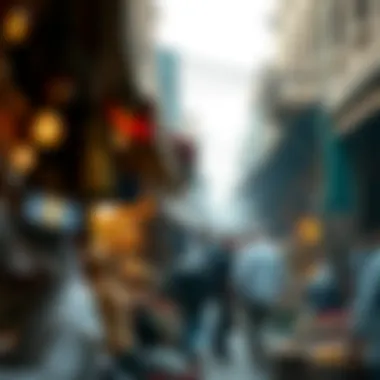

Understanding Gold Pricing
Gold pricing is multifaceted, affected by various factors ranging from market trends to global events. When purchasing gold at the souq, it’s essential to grasp the difference between the gold price and the final retail price. Gold prices fluctuate daily, driven by international markets. Local sellers often utilize the current spot price as a baseline in their pricing. However, retail prices might include other costs, such as the craftsmanship of jewelry.
- Spot Price: This is the market price of gold per ounce, updated regularly.
- Making Charges: This refers to the labor costs involved in designing the piece.
- Taxes and Duties: Local taxes may be applied to the final sale price.
Being savvy about these components ensures that buyers do not overpay. The heart of the negotiation lies in understanding these nuances.
Negotiation Practices
In the bustling energy of the souq, bargaining is more than just a customary practice; it’s an art form. Customers should expect to engage in negotiation when purchasing gold. While locals may approach the process with ease, newcomers might find it daunting. Here’s how to navigate this delicate dance:
- Do Your Homework: Before stepping foot into the souq, familiarize yourself with current gold prices. Knowledge is power and can bolster your negotiating stance.
- Start Lower: It’s common to offer a bid below the seller’s asking price. It opens the door for back-and-forth discussions.
- Be Polite but Firm: Establish rapport with the vendor. Trust and mutual respect can lead to better deals.
- Know When to Walk Away: Sometimes, the best negotiating tactic is to walk away. This gesture may prompt the seller to revisit their pricing as you leave.
Types of Gold Jewelry Available
The Gold Souq boasts a rich variety of gold jewelry, with each piece often telling its own story. Buyers can expect an array of designs that reflect cultural significance while also embracing modern aesthetics. Here’s what you might find:
- Traditional Pieces: Designs that echo the age-old artistry of Arabian culture, such as intricate necklaces and earrings adorned with filigree.
- Customizable Items: Many sellers offer to tailor pieces to meet personal preferences from design to length.
- Investment Bars: Apart from jewelry, the souq features gold bars, which are a popular choice for investment purposes.
- Modern Designs: Younger generations may also gravitate toward contemporary pieces, including sleek bracelets and minimalist designs.
Ultimately, the Gold Souq serves as a cornucopia of options, allowing buyers to find something fitting their taste and budget.
"Navigating the Gold Souq is not just about buying gold; it’s about engaging with the culture, history, and economics of the UAE."
In sum, buying gold at the souq is an experience laced with significance. Understanding pricing, mastering negotiating skills, and recognizing the available jewelry types equip buyers with the tools they need to make informed purchase decisions, ensuring that the journey through the souq culminates in a favorable and meaningful acquisition.
Tourist Experience at the Gold Souq
As you step into the Gold Souq, the vibrant pulse of the bustling marketplace instantly envelops you. This isn’t just a shopping trip; it's a cultural immersion and an experience that resonates with the tradition and heritage of the UAE. Visitors find themselves captivated, not merely by the gleaming gold but by the myriad of interactions and stories that unfold around them.
Exploring the Gold Souq goes beyond purchasing exquisite jewelry; it’s about understanding the art of trade, the depth of local customs, and the shared pride in this centuries-old craft. The charm of this souq lies in its ability to make every tourist feel like a part of the community—a bridge between ancient traditions and the dynamic modern world.
Must-See Attractions
If you think a gold market is just about the bling, think again. The Gold Souq's allure is multifaceted, offering various attractions that catch the eyes of even the most discerning visitors. Notable spots within the souq include:
- Al Ghurair Center: This sprawling center is often recognized as a landmark. Within it, you’ll find unique gold designs that tell stories of the region's past.
- Khan Murjan: Visitors are often charmed by this traditional-style marketplace that feels like stepping back in time. It offers an array of gold jewelry, infused with local culture.
- Gold Mall: Known for its extensive collection, the Gold Mall showcases both vintage and contemporary pieces, catering to all tastes.
A truly engaging highlight is witnessing local artisans skillfully working on their craft. Vendors are often willing to share their insights on the creation process, enhancing tourists' appreciation for the gold they see.
Culinary Options Nearby
After a long day of exploration, refueling becomes essential, and the culinary scene around the Gold Souq does not disappoint. Conveniently located nearby are various eateries that offer traditional Emirati cuisine to international dishes. Tourists can indulge in:
- Shawarma: A popular street food that’s quick, delicious, and satisfying.
- Knafeh: This must-try dessert is sweet and cheesy, a delightful way to cap off the shopping escapade.
- Karachi Darbar: Renowned for its hearty biryanis and kebabs, it’s a great stop for those craving savory meals.
Food stalls also line the streets, selling quick bites that reflect the diverse heritage that characterizes the UAE. It’s an excellent opportunity for tourists to try local flavors while resting their feet.
These experiences—both the dazzling displays of gold and the mouthwatering local fare—help create a tourist experience that’s rich, memorable, and deeply rooted in the spirit of the UAE.
Preservation and Future Outlook
The Gold Souq stands as a testament to the rich history and culture of the UAE, serving not just as a marketplace but as a symbol of resilience and endurance of local traditions. The preservation of this landmark is vital for several reasons. First and foremost, it fosters a connection between the past and the present, allowing newer generations to appreciate the craftsmanship that has been honed over centuries.
The Gold Souq is more than just a shopping destination; it serves as a cultural hub where various generations can gather, share stories, and celebrate local customs. Preserving this space means safeguarding a piece of community identity. Consequently, it provides opportunities for economic growth, as tourism and local patronage thrive in an environment that promotes tradition and heritage.
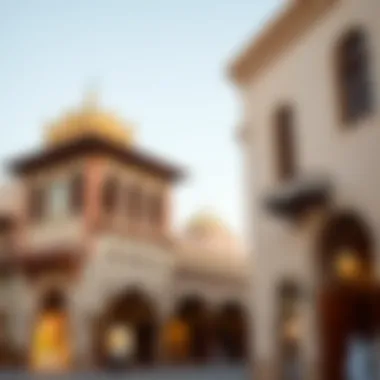
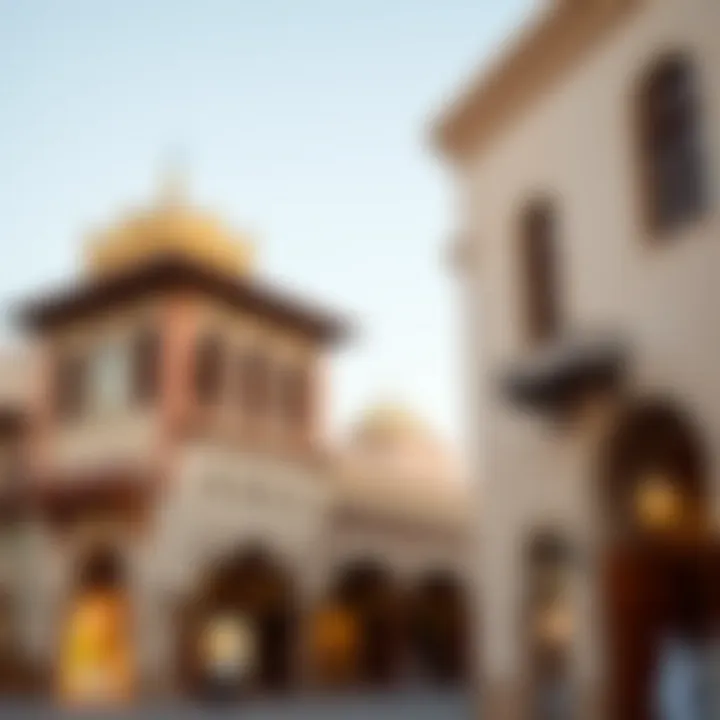
On the other hand, there are pertinent challenges that need addressing. Balancing preservation efforts with modern market dynamics is no small feat. The Gold Souq must remain relevant in the face of growing competition from online platforms and modern shopping complexes. Thus, the strategy for preservation needs to incorporate adaptation to contemporary practices while maintaining the site's unique cultural tapestry.
Maintaining Cultural Heritage
Cultural heritage preservation goes hand in hand with keeping traditions alive. The Gold Souq, with its intricate designs and detailed craftsmanship, echoes a time when hand-made goods defined luxury. Maintaining this cultural heritage requires community involvement and a concerted effort from stakeholders, including local government and businesses.
Efforts might include organizing community events that celebrate gold craftsmanship, hosting workshops where artisans can demonstrate their skills, or even simple initiatives like guided tours that educate tourists about the souq's history. These activities not only encourage local participation but also draw in tourists who are keen to experience authentic Emirati culture firsthand.
Moreover, implementing educational programs in schools about the significance of the Gold Souq can instill pride in young citizens. When children learn about their heritage, it fosters a sense of belonging and responsibility to protect it.
Adapting to Modern Trends
As the winds of change sweep through the markets, it becomes imperative for the Gold Souq to adapt rather than resist. Modern consumers are drawn to unique experiences, and while the charm of traditional gold trading remains, integrating modern conveniences could enhance the visitor experience.
Incorporating digital technology, like virtual reality tours or mobile applications that provide information about vendors, can make the souq more accessible and appealing. Furthermore, offering online purchasing options can cater to a broader audience, ensuring that the allure of the Gold Souq reaches international markets.
Changes in consumer behavior also demand flexibility in the types of products offered. Younger shoppers may prefer more contemporary designs alongside traditional pieces. Therefore, working with local artisans to innovate new styles while keeping traditional aesthetics intact can bridge this gap.
Adapting does not mean compromising; rather, it signifies a thoughtful approach toward merging the old with the new. By embracing modern trends, the Gold Souq can ensure its survival and relevance for future generations while still radiating the history and culture that it is steeped in.
In summary, striking the balance between preserving the rich cultural heritage of the Gold Souq and adapting to modern market realities is essential. It requires collective effort and a forward-thinking approach to secure the souq's place in an evolving world.
For further reading on cultural preservation, consider resources from Wikipedia and Britannica.
Crafting a vision that respects the past while looking towards the future will undoubtedly position the Gold Souq as a lasting legacy in the UAE’s vibrant tapestry.
Challenges Faced by the Gold Souq
The Gold Souq stands as a testament to both tradition and the intricate web of commerce in the UAE. Yet, this iconic marketplace does not sail smoothly; it faces a myriad of challenges that could impact its standing and operational effectiveness. Understanding these hindrances is crucial for anyone interested in trade and investment within this vibrant region. Addressing market competition and navigating regulatory issues are among the pressing concerns that traders and buyers alike must contend with.
Market Competition
The competition in the gold trading market is fierce. While the Gold Souq has carved out its niche, it faces challenges from various fronts. Newer online gold platforms have changed how consumers interact with gold purchases. These platforms often provide lower prices due to reduced overhead costs. They also offer convenience, allowing users to shop from the comfort of their homes. This trend does not just create competition, it reshapes buyer expectations.
Moreover, retailers within the souq must continuously innovate to attract clientele. They cannot rely solely on the historical charm of the souq. Offering unique designs or customization options can help differentiate a vendor from its competitors. However, this poses its own challenges; creativity can require investment and resources that not all vendors can afford.
Understanding the shifting dynamics in buyer preferences is key. Customers are increasingly aware of their options and willing to shop around. As a result, vendors need to maintain competitive pricing while preserving quality. Striking that balance is crucial for sustainability in this competitive marketplace.
Regulatory Issues
Regulatory hurdles also cast a shadow on the operations within the Gold Souq. The gold trading business is subject to various laws and regulations aimed at ensuring fair trade practices and discouraging illicit activities. While these regulations serve a vital purpose in fostering consumer protection, they can often complicate the day-to-day operations of vendors in the souq.
For instance, the process for obtaining import and export licenses can be complex and time-consuming. This affects not just local traders, but also those who wish to bring in gold from different markets. Fluctuating regulations based on economic policy changes can throw a curveball into how businesses operate. Additionally, compliance with strict anti-money laundering laws means that vendors must tread cautiously in their dealings, lest they find their operations scrutinized.
The regulatory landscape can feel like a double-edged sword. While it promotes integrity within the market and safeguards consumer interests, it may also stifle the agility of small traders who are less equipped to handle bureaucratic complexities. As the gold market evolves, so too will the regulations that govern it, making it imperative for sellers at the Gold Souq to remain adaptive and informed.
"Navigating the landscape of regulations is like walking a tightrope; balance is key to ensure safety while making strides forward."
Culmination
The exploration of the Gold Souq in the UAE is not just an academic venture; it encapsulates the very essence of a vibrant cultural tapestry woven through centuries of trade and tradition. As one wanders through the narrow aisles and stunning displays, it's evident that this souq is a significant hub—not only for commerce but for the intricate connections it fosters among communities and cultures.
Summarizing Key Insights
- Cultural Legacy: The Gold Souq serves as a living testament to the UAE's rich cultural legacy, marrying modernity and tradition.
- Economic Influence: The economic impact is profound, bolstering local businesses while also playing a pivotal role in the global gold market.
- Tradition of Negotiation: The experience of purchasing gold goes beyond mere transaction; it's an age-old practice steeped in negotiation and relationship-building.
- Tourist Magnet: For travelers, the Gold Souq is a must-visit destination, offering a unique glimpse into a vital aspect of UAE life.
This array of insights underlines not only why the Gold Souq continues to captivate but also how it remains relevant in our ever-evolving world, where the interplay between commerce and culture is becoming increasingly important.
Final Thoughts
So, when you find yourself visiting the UAE, the Gold Souq beckons not just as a place to buy gold but as an opportunity to engage with a narrative that raises one’s appreciation for the complexities of trade, culture, and relations in this remarkable region.







